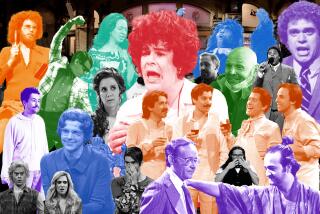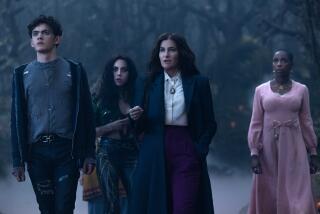MUSIC & DANCE : The Beckmesser Awards of 1990
I t was a happy, sad, frustrating, exhilarating, discouraging, encouraging, soothing, frazzling, stimulating, depressing, uplifting, bracing, painful, provocative, dull, exciting, hysterical, lackadaisical, exceptional, humdrum year. Just like 1989.
To commemorate the high--and low--points, The Times proudly and shamelessly presents the 22nd annual awards dedicated to the spirit and memory of Nurnberg’s immortal , most noble , most misunderstood humanitarian, critic, musicologist, lutanist, poet, bon vivant and guardian of public virtue, Sixtus Beckmesser.
Let us know if we have overlooked anything.
Cheers Best-hyped concert of the year: The splashy program that marked the second coming (since his appointment as music-director-to-be) of Esa-Pekka Salonen. Most memorable demonstration of symphonic bloat: Richard Strauss’ sprawling “Alpensinfonie” as tautly performed by the Los Angeles Philharmonic under its undervalued former music-director, Andre Previn. Philharmonic phenomenon of the year: Gerard Schwarz, who took over “Gurrelieder” at ridiculously short notice and earned a triumph even though this apparently was his first encounter with Schoenberg’s massive challenge. Happiest return from the dead: The dauntless D’Oyly Carte company, which managed the unlikely feat of self-exhumation and brought a new, delightfully delirious production of “The Pirates of Penzance” to Orange County. Most memorable dark-horse debut: The unheralded, unglamorous appearance at Santa Monica College of a dazzling young pianist from the Soviet Union, Alexander Shtarkman. Most touching demonstration of artistic longevity: The Music Center recital by Mieczyslaw Horszowski, a 97-year-old keyboard wonder whose talent seems to have conquered time. Most poignant memorial: Yo-Yo Ma’s performance, under Previn, of Bloch’s “Schelomo” in tribute to Leonard Bernstein. Anything-you-can-say-I-can-say-bitchier award: To Nathan Lane and Richard Thomas for their brilliant, regal patter-duets in Terrence McNally’s “Lisbon Traviata” at the Taper. The-major-leagues-at-last award: To Yoav Talmi and the splendidly reconstituted San Diego Symphony on the occasion of their daring performance of the mighty Bruckner Seventh. Most welcome, least doleful podium newcomer: Carl St. Clair, the galvanizing force chosen to lead the Pacific Symphony out of its doldrums. Reports-of-the-demise-of-ballet-may-be exaggerated award: To Twyla Tharp for her delightful “Brief Fling,” possibly the last product of her much-too-brief fling with American Ballet Theatre. Year’s most idealistic terpsichorean: Bella Lewitzky, a tough survivor of McCarthyism, who turned back a much-needed $72,000 grant and challenged the myopic, politicized National Endowment for the Arts to a good old American battle in the courts. The Dietrich Fischer-Dieskau Award for sensitive baritones: To Thomas Hampson, for his uncompromisingly sophisticated song recital, elegantly accompanied by Armen Guzelimian, in innocent Orange County. The Julius Patzak Award for sensitive tenors: To Hans-Peter Blochwitz, for his eloquent, intimate program of Lieder sponsored by the San Diego Opera in La Jolla. Most startling orchestral revelation: Prokofiev’s “Lt. Kije” as roared, soared, crooned, nudged and mocked by the inspired Leningrad Philharmonic under the inimitable Yuri Temirkanov. Most exciting operatic debutante: Ealynn Voss, a virtually unknown soprano whose assault on the impossible role of Turandot with Opera Pacific justified comparisons with Birgit Nilsson and Edith Turner. Aw-shucks award: To Garrison Keillor, who brought the rarefied aura of Lake Wobegon to a Philharmonic Pension Fund benefit. The Johannes Henken Award for guileless guitarists: To Stepan Rak, a Czech wiz whose 2 1/2-hour orgy at Pasadena Presbyterian showcased wild parodies and a spectacular technique. Most reassuring operatic paragons: Rodney Gilfry, a wide-eyed baritone equally persuasive in Figaro’s Seville and Curly’s Oklahoma at the Music Center; and Christine Weidinger, whose virtuosic Elettra nearly validated a supremely silly staging of Mozart’s “Idomeneo.” Performance-art diva in excelsis: The redoubtable Rachel Rosenthal, who brought sublime incoherence to a piece called “Amazonia” in collaboration with the equally redoubtable E.A.R. Unit. Proudest Pulitzer pundit: Mel Powell, who won the other big prize (what could be bigger than a Beckmesser?) for his complex “Duplicates,” introduced by the Los Angeles Philharmonic under the ever-eager and ever-ready David Alan Miller. Ballet-is-alive-and-well-in-San Francisco award: To Helgi Tomasson, who continues to work reassuring wonders with his charges in San Francisco. Bruno Walter Award for abiding musical mellowness: To Kurt Sanderling, again (and again, and again . . .). The-Russians-are-coming award: To every Tom, Dick and Ivan who can find an engagement in the United States in these unaccustomed days of open commercial borders. E-for-effort award: To Peter Sellars and his dedicated cohorts for putting on an arts festival that baffled devotees of the conventional muses, sometimes flirted with amateurism, but knocked at a lot of important, unfamiliar, long neglected doors. Most useful operatic stimulant: Peter Sellars’ iconoclastic staging of Mozart’s Da Ponte operas as disseminated on public television. Aesthetic flip-flopper of the year: The fossilizing music critic of the Los Angeles Times, who came close to liking “Nixon in China” the third time around. Jeers Cultural disaster of the year (and beyond): The shameful, destructive, revisionist Helmsification of the National Endowment for the Arts. Most confounding mismatch of the year: The painful confrontation at the Music Center between Mozart’s “Idomeneo” (an exercise in classic nobility) and the staging team of Frank Corsaro and Maurice Sendak (specialists in quasi-comic whimsy). Most confounding compound mismatch: Nadja Salerno-Sonnenberg and Cecile Licad (mismatch No. 1) playing intimate chamber music in the wide open spaces of the Orange County Performing Arts Center (mismatch No. 2). Year’s most interesting symphonic failure: Yuri Temirkanov’s overdramatized, precious, chronically unidiomatic but heroic performance of the Mahler Second with the L.A. Philharmonic. We-hardly-know-ye award: To Simon Rattle--our splendid, Salonenesque principal guest conductor--who hardly ever graces the local podium. Greatest vocal disappointment: The once-over-loudly recital in La Jolla by Dmitri Hvorostovsky, an immensely talented and obviously misguided young baritone from the Soviet Union. Saddest royal setback of the year: The loss of quality and, more important, individuality in the once great Concertgebouw Orchestra of Amsterdam under Riccardo Chailly. Saddest Soviet setback: The generally low quality of dancing (thank goodness for Alexei Fadeyechev), the abysmal, outdated choreography--and, most worrisome, the pervsasively low morale--at the Bolshoi Ballet of Yuri Grigorovich. Greatest operatic muddles: The Russified botch of Verdi’s “Don Carlo” that the Music Center Opera chose to substitute for “Pique Dame” when Placido Domingo pulled out of the Tchaikovsky opus; the dull, confusing, pop-culture “Orfeo” staged by the Music Center as a vehicle for the declining Marilyn Horne; the miscasting--partly nepotistic--of the central roles in “Fidelio” by the same company. Runner-up among operatic muddles: The grubbily conventional productions of “Cav” and “Nav” (a.k.a. “La Navarraise”) as mustered in the big house by the usually adventurous, small-scaled Long Beach Opera. Year’s greatest puzzlement: The trendy, black-on-black, chock-full-of-confusing-information, impossible-to-read program brochure produced by the Los Angeles Festival. Unholy alliance of the year: The perestroika partnership between Oleg Vinogradov, director of the Kirov Ballet in Leningrad, and the Rev. Sun Myung Moon, dubious socio-politico-religious-artistic guru from Korea, in a lavish new dance academy based in Washington. The Jimmy Durante Award commemorating the year’s most revolting development: To the avant-garde genius who planned to snuff out an innocent rat named Sniffy in the name of performance art. Non-ecstatic post-Balanchine award: To Peter Martins for his “Ecstatic Orange” and other trendy exercises in Orange County--which make one worry about the enduring quality of life, as well as art, at the New York City Ballet. Unkindest cut of all: The decision to leave out the finale of Mozart’s “Don Giovanni,” as presented by Opera Pacific. With-a-board-like-this-who-needs-friends? award: To the staunch guardians of American Ballet Theatre who, facing yet another fiscal crunch, immediately threatened to disband a company they apparently deem dispensible. Dirtiest dealings of the year: The attempts by a moneyed contingent of the board to oust Gerald Arpino from leadership of the financially troubled Joffrey Ballet and remake the company in some other image. Better-late-than-never-but-this-is-ridiculous award: To the local PBS station for starting the 3 1/2-hour telecast of Sellars’ “Figaro” at 9:30 p.m. Minimalist-water-torture award: To the ever-stimulating, ever-daring Kronos Quartet for “Salome Dances for Peace,” a pretentious two-hour Dalmane substitute by Terry Riley, the inspired drone who gave us “In C.” Saddest, least beneficial benefit: The amateurish AIDS concert in Pasadena featuring has-beens, would-be’s and no-shows. Year’s farthest-reaching attack on the concept of opera as valid modern drama: The dull, reactionary, clumsy, comic-book “Ring” staged for public television by the Metropolitan Opera. (The actual “Ring” Comics, published by DC, were more honest and far more engaging.) Worst planning conflict of the year: The decision to book the not-too-glamorous Australian Ballet at the Orange County Performing Arts Center while the fabled (if not fabulous) Bolshoi was appearing at Shrine Auditorium. Curious and Curiouser Year’s most profound unanswered questions (in no particular order): Who will succeed John Currie at the helm of the Los Angeles Master Chorale, and how? Can Iona Brown wave a bow instead of a baton at the Los Angeles Chamber Orchestra forever? Can opera co-exist with French politics at the embattled Bastille? Where--on what highway--does one draw the line between dilettantism and invention in that murky area of expression called performance art? Whatever happened to Pina Bausch? It’s-just-a-rag award: To the financially disordered Los Angeles Festival, for selling leftover street banners, signed by Peter Sellars, for $150 (the price dipped as much as 70%, however, in the fire sale). Balletic enigma: Can American Ballet Theatre survive a bargain-basement season in which the greatest novelties seem to be new sets for an old staging of “Coppelia” and a new staging of “Don Quixote” with old sets? Now-that-we-have-him-what-will-we-do-with-him? award: To the Los Angeles Philharmonic, for appointing the overworked, constantly moving, symphonically innocent, delightfully naughty Peter Sellars as “creative consultant.” The annual what-ever-happened-to-Misha award: To Mikhail Baryshnikov, who fled ABT and joined Mark Morris in a provocative new modern-dance company that appears only in the Midwestern boonies. Best sic-transit-gloria pastime: Misha-bashing, the popular new sport among ballet aficionados that proves how quickly they forget. Ballet-of-what? award: To the nearly indomitable John Clifford for bravely founding, hyping and touring a quasi-company called Ballet of Los Angeles that has only appeared once in Los Angeles. The but-what-happend-to-”Rigoletto”? award: To the Music Center Opera, which, for better or worse, seems more interested in esoterica--and in gimmickry--than in operatic basics. Vita-brevis-ars-longa award: To Yuri Temirkanov, who called Alfred Schnittke a genius, had a year to prepare his Cello Concerto for the Philharmonic, and then cancelled the performance because he said he had not lived with the piece long enough. Orchestral bait-and-switch award: To the Pacific Symphony, which offered its music directorship to the eminently competent Lawrence Foster, then changed its mind, withdrew the offer and annointed the more flamboyant Carl St. Clair. Year’s most timid pat on the back: The renewal of the Music Center contract that keeps the embattled Joffrey Ballet bicoastal--for just one more year. Do-we-really-need-this? award: To the Music Center Opera for toying with electronically amplified musical comedy (“Oklahoma!”) when it could be producing more Puccini or Verdi. Mediocrity-is-alive-and-unwell-in-San Francisco award: To the new regime at the War Memorial Opera House, which survived unprecedented strike cancellations to put on a season that almost made one long for the golden days of Terence McEwen. Misplaced-ambition award: To the stillborn Garden Grove Opera, for thinking it could put on a reasonable facsimile of “Semiramide” with minimal talent and a budget of 34 cents. Most deserved bomb: The cancellation of “Aida” at the Coliseum, a glitzy, multimillion-dollar amateur-night fiasco waiting to happen. Where-are-you-Geraldo-when-we-need-you? award: To Gelsey Kirkland, for writing a new volume of intimate memoirs that focuses on art rather than dirt. Milestones Most interesting new faces in old jobs: Jane Hermann, feisty boss-person at ABT; Joseph Volpe, successor to the briefly powerful Hugh Southern at the Met; Kurt Masur, the new Mehta (from erstwhile East Germany) at the New York Philharmonic; Gerard Mortier, gallic heir to Karajan’s Germanic fortunes in Salzburg. Most ballyhooed retirement: Dame Joan Sutherland’s lavish farewell to opera in Sydney. Least ballyhooed retirement: The ultra-reliable Ross Stretton’s typically quiet withdrawal from ballet in New York. Most alarming company move: The suspension of activity at the Dance Theater of Harlem, in response to financial blight. Most reassuring reversal: The resumption of activity at the Dance Theater of Harlem, in response to financial reassessments and belated bail-outs. You- can- go-home-again awards: To Mstislav Rostropovich, Vladimir Ashkenazy, Natalia Makarova and other Soviet outcasts who, it turns out, are not non-persons in the Gorbachev era. Pop-goes-the-Bowl award: To Ernest Fleischmann for creating a second Hollywood Bowl orchestra, under John Mauceri, to court the frivolous muses while our big band concentrates on serious challenges. Ave atque vale (in no particular order): Leonard Bernstein, Kurt Baum, Vladimir Ussachevsky, Ian Horvath, Alexis Fekula, Paul Amadeus Pisk, Reginald Goodall, Lee Goldstein, Joachim Chassman, Albert Goldberg, David Stivender, Muriel Roth, Peggy van Praagh, Arthur Gold, Jesse C. Reese Jr., Alexei Yudenich, Margaret Craske, Martial Singher, John Dexter, Christina Carroll, Sheldon Shkolnik, Felix Salmaggi, Ernst Bacon, Nanette Guilford, Kurt Weinhold, Robert Breen, Sarah Vaughan, Frank W. Cummings, Marion Downes, Else Mayer-Lismann, Robert Donington, Erna Berger, Ilse Hollweg, Jose De Vega Jr., Sabicas (Augustin Castelon), Paul Wolfrum, Elisabeth von Schuch-Ganzel, Helene Pons, Muriel Harding, Muriel Dickson, Glade Peterson, Luigi Nono, Peter Racine Fricker, Ronald Dowd, Martin Shwartz, Viola Hegyi Swisher, Wayne Turnage, Ben Holt, Evangeline Johnson Merrill, Ashley Lawrence, Stephen J. Borell, Antoine Vitez, Jean Marie Gee, Michael Shawn, Misha Raitzin, Bernard Lias, Demian Acquavella, Florence Guarino, Martin Workman, Jim Henson, Bob Kowalski, Albert A. Grobe, Joseph H. Ott, Gerald Fitzgerald, Vic Stornant, Elliott Galkin, Jack Gilford, Edna McRae, Eva Turner, Sander Gorlinsky, Michael Haimsohn, Thomas Nyfenger, Elizabeth Harwood, Michael Kurkjian, Juan Antonio, Steven Gordon, Francis J. Little, Clifford Harvuot, Fedele d’Amico, Mario Medici, John Briggs, Ronit Amir Lowenthal, Pearl Bailey, Joseph DiTullio, Samuel H. Mayes, Sari Biro, Fernando Valenti, Zoltan Rozsnyai, Maurice Gendron, Sylvia Deutscher Kusher, Frederick Schang, David Berfield, William Bales, Hermes Pan, Marcel F. Grilli, Alfonso Cata, Werner Janssen, Eleanor Steber, Peter Herman Adler, John Grady, Jerold Norman, Joseph Gimma, Siegfried Behrend, Frank Granville Barker, Vilem Pribyl, Betty Walberg, Donn Laurence Mills, Norbert Vesak, Jurgen Grundheber, Maurice Handel, Alexander Zakin, Jorge Bolet, Daniel Guilet, Robert Leonard, Franco Autori, Naomi Reynolds, Mary Martin, Arnold Matters, Helena Braun, Richard Lewis, Vic Upshaw, Joseph Attles, Sol Kaplan, Ralph Brown, Anna Ludmilla, Michael Shawn, Ira Glackens, Bulent Ariel, John Alexander, Boris Kochno, Ernst Bacon, Isaac Mitton Stewart, Carey Erickson, Scott Reeve, Marie Fisher-Lemarr, Natan Brand, Max Epstein, Aaron Copland.
More to Read
The biggest entertainment stories
Get our big stories about Hollywood, film, television, music, arts, culture and more right in your inbox as soon as they publish.
You may occasionally receive promotional content from the Los Angeles Times.










